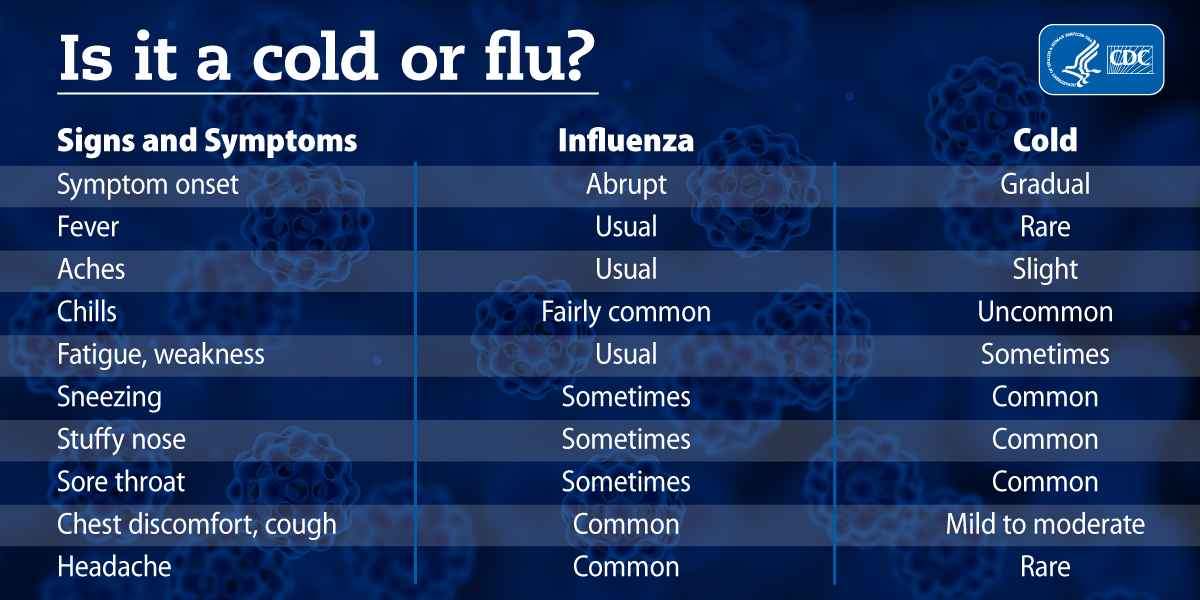DCH Corner – Cold Vs. Flu
February 14, 2018
This year has been an active year for cold and flu viruses. As we continue to experience high rates of viral colds and flu, we want to be sure we share the differences between a cold and the flu virus, and how you should deal with each.
What is the difference between a cold and the flu?
The flu and the common cold are both respiratory illnesses, but they are caused by different viruses. Because these two types of illnesses have similar symptoms, it can be difficult to tell the difference between them based on symptoms alone. In general, the flu is worse than the common cold, and symptoms are more common and intense. Colds are usually milder than the flu. People with colds are more likely to have a runny or stuffy nose. Colds generally do not result in serious health problems, such as pneumonia, bacterial infections, or hospitalizations. Flu can have very serious associated complications.
How can you tell the difference between a cold and the flu?
Because colds and flu share many symptoms, it can be difficult (or even impossible) to tell the difference between them based on symptoms alone. Special tests that usually must be done within the first few days of illness can tell if a person has the flu.
What are the symptoms of the flu versus the symptoms of a cold?
The symptoms of flu can include fever or feeling feverish/chills, cough, sore throat, runny or stuffy nose, muscle or body aches, headaches and fatigue (tiredness). Cold symptoms are usually milder than the symptoms of flu. People with colds are more likely to have a runny or stuffy nose. Colds generally do not result in serious health problems.
How do I care for a cold or the flu?
Wash your hands frequently. Alternate Tylenol and/or ibuprofen for aches/fever, and follow the instructions on the medication you purchase, or follow a doctor’s order. Drink plenty of fluids such as water or juice. Get enough rest, and let your body fight the virus. Avoid going out in public, and if you must leave the house, wear a mask if you have a cough.
What about Tamiflu?
Tamiflu does not cure the flu. It is costly, and like any medication it carries a risk of side effects. Most healthy people will overcome the flu without major complications if the symptoms can be managed. Those that are at more risk are those very young or old or those that have other chronic conditions affecting their overall health. Sometimes Tamiflu may be ordered for these patients, but it still does not cure the flu, or lower the risk of contagion.
How can you prevent the flu?
Get a flu shot. Wash your hands frequently, especially when visiting high traffic areas or areas with a concentration of people who make be sick. Cover your mouth with your sleeve when you cough, and immediately wash your hands after coughing into them or using a tissue. If you contract the flu, stay home and avoid crowds to lower the risk of spreading the virus further.
When should I seek emergent medical attention?
If you have difficulty breathing, shortness of breath, chest pain, severe abdominal pain, confusion, sudden dizziness or severe or constant vomiting, seek medical attention right away.
To learn more about the common symptoms of a cold vs. the flu, view the chart above. We hope you will do your part to help contain the spread of the cold and flu viruses, and we hope you stay healthy through the rest of this cold season.
To learn more about Decatur County Hospital and our available services, please visit www.www.decaturcountyhospital.org, or follow us on Facebook @DecaturCountyHospitalIowa. We want to hear from you! Email us at serb@d-c-h.org if you have a topic or question you would like us to cover in one of our DCH Corner articles.
Image courtesy of https://www.cdc.gov/flu/about/qa/coldflu.htm


